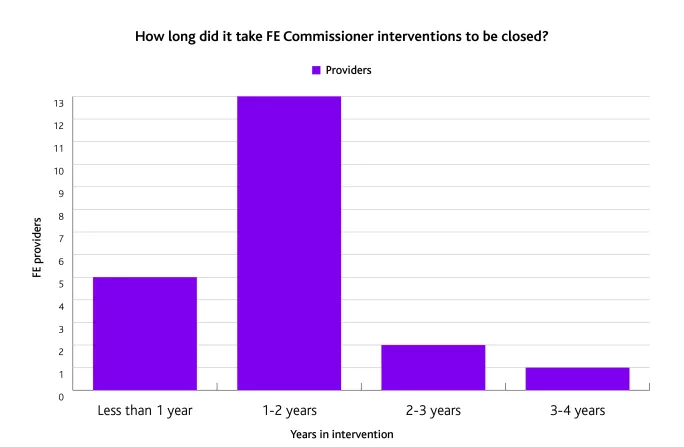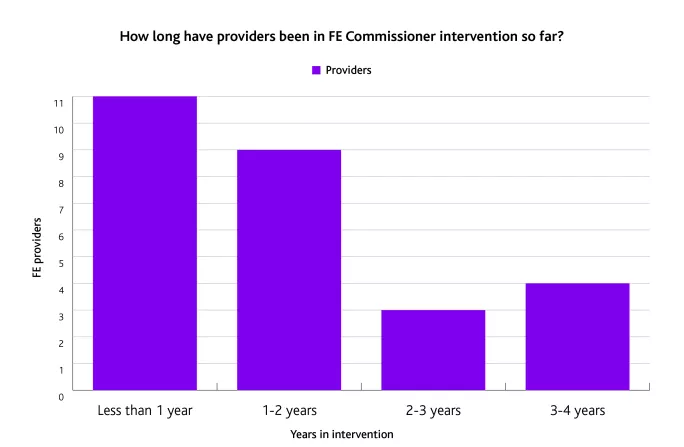- Home
- Revealed: the scale of FE commissioner intervention
Revealed: the scale of FE commissioner intervention

More than 25 colleges are currently in formal intervention by the further education commissioner, and one of those has been in intervention for more than four years, new research has shown.
This comes as the commissioner's team is understood to have resumed its college and intervention activity after that was paused owing to the coronavirus pandemic.
According to the Department for Education's response to a freedom of information request, Hull College Group was first placed into formal intervention in February 2016 after a notice of concern for its financial health was issued by the Education and Skills Funding Agency – it remains in intervention 43 months later, the longest of any college group.
In a report published today by the Further Education Trust for Leadership (FETL), entitled Blame or betterment? Regulation and intervention in further education, experiences of intervention are "inconsistent" across the FE sector.
Opinion: FE commissioner intervention is inconsistent in sector
News: Traineeships to get £111m boost from Treasury
Background: 13% of colleges fear their solvency is at risk
Author Stephen Exley found that while the average duration of intervention for colleges is 16 months, it varied widely between institutions. Of those currently in commissioner intervention, 11 providers have been so for less than a year, whereas more than a quarter have been so for two years or more, with four of them having been in this category for over three years.
So far in 2020, two institutions have entered formal intervention – one of them Coventry College.

Formal intervention is triggered if a college is rated "inadequate" by Ofsted, receives a notice of concern from the ESFA about their finances, fails to meet ESFA minimum standards or is found to be at high risk of failure following a diagnostic assessment.
Colleges may receive a diagnostic assessment if they have a "requires improvement" rating from Ofsted, have an Ofsted "requires improvement" or "inadequate" rating for apprenticeships, or are assessed by the ESFA to be in early intervention for financial health.
Today's FETL report finds that since current FE commissioner Richard Atkins was appointed in November 2016, 48 further education providers have been placed in intervention – 44 of which were colleges.
Currently, there are 27 interventions still ongoing; 11 of the other 21 inventions closed due to the Department for Education being satisfied by the progress made, and 10 ended because the institution merged with another. Of the 21 closed interventions, five cases were resolved within a year, with 13 closed within two years.

'No typical journey'
Stephen Exley, former Tes FE editor and director of external affairs at charity Villiers Park, said that institutions’ experiences of regulation depended on which inspectors, advisers or officials were assigned to them.
He said: “There is no typical journey out of ‘inadequate’ or clear path out of FE commissioner intervention. Take the latter: while five colleges left formal intervention within a year, one has remained in it since the end of 2016.
“This regulatory inconsistency is by no means surprising. The direction of policy travel since 2010 has been away from regulation and state control towards deregulation and autonomy. The government’s powers to intervene in mismanaged and underperforming colleges were clipped by the Education Act 2011, meaning that governing bodies remain independent and in control of managing their own affairs – to such an extent that colleges were in 2012 taken out of the public sector by the Office for National Statistics.
“The government has limited powers to directly intervene, which has resulted in the evolution of a patchwork regulatory and intervention framework to mitigate against this, culminating in the insolvency regime created by the 2017 act.
“Efforts have been made to draw these different regulatory strands together into a single coherent framework for oversight and intervention. Yet just as too many cooks spoil the broth, the proliferation of regulatory bodies inevitably increases the risk of a lack of clarity over areas of responsibility. At worst, a lack of communication and coordination between agencies can inadvertently conspire to create overlapping or contradictory audit requirements, dragging resources and time away from frontline education.”
A spokesperson for Coventry College said: “We were issued with a notice to improve in February 2020 from the ESFA as a result of the leadership team working proactively with our external agencies to alert them to our financial position for the 2019-20 academic year.
“We continue to work closely with those external agencies including the FE commissioner’s team to demonstrate transparency around our plans for recovery and financial improvement. This is to ensure that we are a sustainable college that serves the needs of the community and region. Since the creation of the new Coventry College in 2017, we have continued to make improvements as identified by the college’s Ofsted report in September 2019.”
The Department for Education and Hull College have been approached for comment.
Keep reading for just £1 per month
You've reached your limit of free articles this month. Subscribe for £1 per month for three months and get:
- Unlimited access to all Tes magazine content
- Exclusive subscriber-only stories
- Award-winning email newsletters



